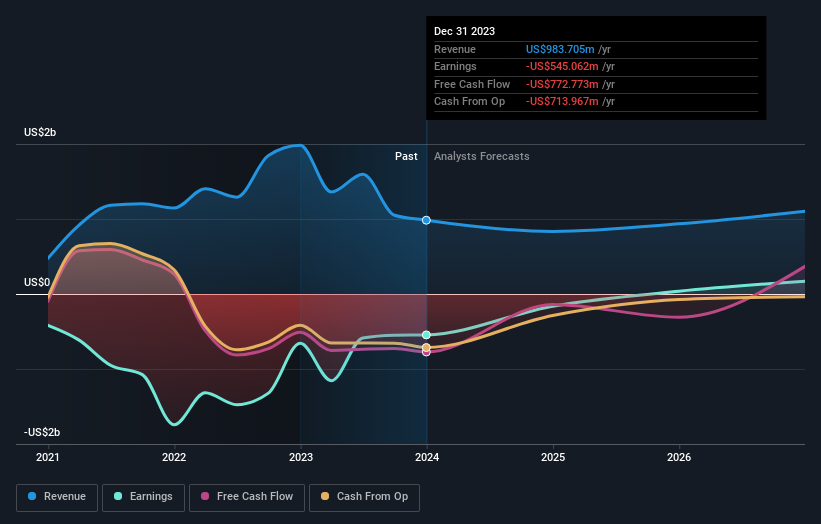Earnings Update: Novavax, Inc. (NASDAQ:NVAX) Just Reported And Analysts Are Trimming Their Forecasts
Novavax, Inc. (NASDAQ:NVAX) missed earnings with its latest full-year results, disappointing overly-optimistic forecasters. Revenues missed expectations somewhat, coming in at US$984m, but statutory earnings fell catastrophically short, with a loss of US$5.41 some 28% larger than what the analysts had predicted. This is an important time for investors, as they can track a company's performance in its report, look at what experts are forecasting for next year, and see if there has been any change to expectations for the business. With this in mind, we've gathered the latest statutory forecasts to see what the analysts are expecting for next year.
View our latest analysis for Novavax
Following the recent earnings report, the consensus from five analysts covering Novavax is for revenues of US$834.6m in 2024. This implies a chunky 15% decline in revenue compared to the last 12 months. The loss per share is expected to greatly reduce in the near future, narrowing 66% to US$1.33. Yet prior to the latest earnings, the analysts had been forecasting revenues of US$883.4m and losses of US$0.30 per share in 2024. So it's pretty clear the analysts have mixed opinions on Novavax after this update; revenues were downgraded and per-share losses expected to increase.
There was no major change to the consensus price target of US$18.25, signalling that the business is performing roughly in line with expectations, despite lower earnings per share forecasts. That's not the only conclusion we can draw from this data however, as some investors also like to consider the spread in estimates when evaluating analyst price targets. Currently, the most bullish analyst values Novavax at US$38.00 per share, while the most bearish prices it at US$5.00. We would probably assign less value to the analyst forecasts in this situation, because such a wide range of estimates could imply that the future of this business is difficult to value accurately. With this in mind, we wouldn't rely too heavily the consensus price target, as it is just an average and analysts clearly have some deeply divergent views on the business.
Looking at the bigger picture now, one of the ways we can make sense of these forecasts is to see how they measure up against both past performance and industry growth estimates. These estimates imply that revenue is expected to slow, with a forecast annualised decline of 15% by the end of 2024. This indicates a significant reduction from annual growth of 47% over the last five years. Compare this with our data, which suggests that other companies in the same industry are, in aggregate, expected to see their revenue grow 17% per year. It's pretty clear that Novavax's revenues are expected to perform substantially worse than the wider industry.
The Bottom Line
The most important thing to note is the forecast of increased losses next year, suggesting all may not be well at Novavax. Unfortunately, they also downgraded their revenue estimates, and our data indicates underperformance compared to the wider industry. Even so, earnings per share are more important to the intrinsic value of the business. The consensus price target held steady at US$18.25, with the latest estimates not enough to have an impact on their price targets.
With that in mind, we wouldn't be too quick to come to a conclusion on Novavax. Long-term earnings power is much more important than next year's profits. We have forecasts for Novavax going out to 2026, and you can see them free on our platform here.
You should always think about risks though. Case in point, we've spotted 4 warning signs for Novavax you should be aware of, and 2 of them are a bit unpleasant.
Have feedback on this article? Concerned about the content? Get in touch with us directly. Alternatively, email editorial-team (at) simplywallst.com.
This article by Simply Wall St is general in nature. We provide commentary based on historical data and analyst forecasts only using an unbiased methodology and our articles are not intended to be financial advice. It does not constitute a recommendation to buy or sell any stock, and does not take account of your objectives, or your financial situation. We aim to bring you long-term focused analysis driven by fundamental data. Note that our analysis may not factor in the latest price-sensitive company announcements or qualitative material. Simply Wall St has no position in any stocks mentioned.

